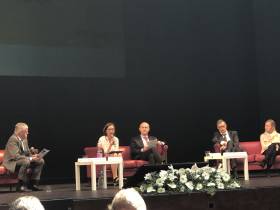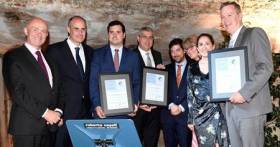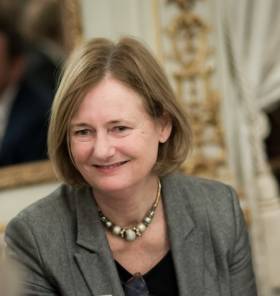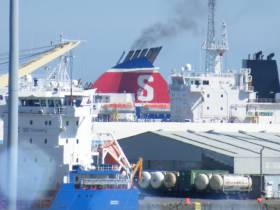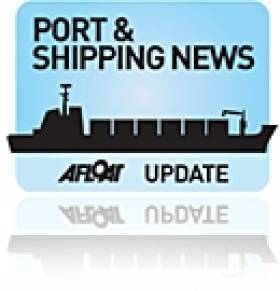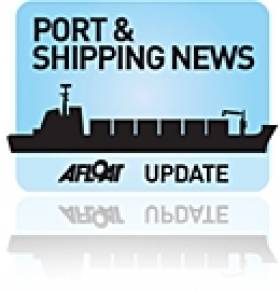Displaying items by tag: EPSO
The European Sea Ports Organisation (ESPO) held its annual conference last month at the Port of Livorno, Italy.
The gathering of European port and maritime industry marked the 16th edition of the ESPO Conference held in the impressive Girondi Theatre.
The theme of the Conference was “Europe’s ports in a new world” and looked into the biggest game changers that oblige port managing bodies and the port and maritime industry in general to change and maybe re-invent themselves.
EPSO have released a photo gallery of the event which is now available by clicking here.
To check out the speakers’ presentations they are also available on EPSO's website.
The next edition of the ESPO Conference will take place in Oslo on 28-29 May 2020.
At the European Sea Ports Organisation (ESPO) annual Conference held in Port of Livorno, Italy, three ports were congratulated today among them Shannon Foynes Port Company for achieving the EcoPorts’ environmental management standard (PERS).
The other ports that received PER status were awarded to the Port of Melilla in Spain and the Port of Ceuta, a Spanish autonomous city in north Africa neighbouring Morocco.
Isabelle Ryckbost, ESPO’s Secretary General, Eamonn O’Reilly, ESPO’s Chairman, and Sotiris Raptis, EcoPorts coordinator, handed over the PERS certificates to the ports’ representatives during the annual ESPO Conference in Livorno.
“I would like to congratulate Port of Ceuta for getting EcoPort’s environmental standard and Shannon Foynes Port Company and Port of Melilla for renewing it. European ports are clearly stepping up their efforts to communicate about their environmental policies and to engage with the surrounding citizens and community. The 2019 citizen wants to be better informed and is more engaged. Ports have to respond with more transparency regarding both externalities and environmental performance, but also have to show how the port in its different functions and responsibilities can contribute to the well-being of the city, the region and the citizen,” says ESPO’s Secretary General, Isabelle Ryckbost.
“It is encouraging that the number of ports that joined EcoPorts is continuously increasing. Environmental challenges such as climate change, air quality, noise and water quality are key priorities for European ports. EcoPorts enables ports to further improve how they deal with the environmental challenges and to communicate to local communities, policy makers, research and civil society their priorities and the progress they make,” says EcoPorts coordinator, Sotiris Raptis.
Compliance with the PERS standard is independently assessed by Lloyd’s Register and the certificate has a validity of two years. PERS is revised after the 2-year period to make sure that the port continues to meet the requirements.
You can find more information on EcoPorts’ PERS and on the ESPO Environmental Report here in addition to this link.
Ports Welcome Agreement on European Maritime Single Window Environment
#ports&shipping- The European Sea Ports Organisation (ESPO) has welcomed the agreement reached on 7 February between the Parliament and the Council on the new regulation establishing a European Maritime Single Window environment (EMSWe).
With the new framework, which will repeal the current Reporting Formalities Directive, important steps are made towards reducing administrative burden and increasing the attractiveness of maritime transport. It provides for the creation of a EMSWe dataset, harmonised National Single Windows and the application of the reporting-only-once principle.
“We see the agreement as a real breakthrough on this very technical but important matter for the maritime and logistics sector. The outcome provides clear engagements towards administrative simplification and a more efficient supply chain. We are very happy that the new framework is recognizing the bottom-up efforts and investments already made and underway by European ports towards creating a one-stop shop for both the reporting formalities and all other services rendered to stakeholders in the logistics chain. The agreement is thus fully compliant with the ambitious digitalisation agenda of many European ports. We would like to thank and congratulate the Parliament - in particular, the rapporteur, Deirdre Clune and the shadow rapporteurs -, the Romanian Presidency and the Commission for their constructive approach in reaching an agreement”, says Isabelle Ryckbost, Secretary General of ESPO.
ESPO supports the following decisions:
Ensuring that the same data sets can be reported in the same way: For European ports, the first priority is to simplify administrative procedures by ensuring that the same data sets can be reported to each competent authority in the same way. ESPO therefore welcomes the emphasis in the new regulation on ensuring that the same data sets can be reported to each National Single Window in the same way by creating a EMSWe maximum dataset. The need to take into account the work carried out at international level is fully backed by ESPO.
Asking additional data remain possible in exceptional circumstances: ESPO is very pleased to see that the final text is giving the possibility to Member States to ask in the event of exceptional circumstances, for additional data, for a limited period of time, without having to ask the permission of the Commission.
Respect for the existing reporting systems: Moreover, European ports very much support the fact that the new regulation is building on the existing reporting systems, the National Single Windows and Port Community Systems (PCS). It is of paramount importance that ports and shipping lines who are currently working with a PCS as a one-stop-shop for both the reporting formalities and all other services rendered to stakeholders in the logistics chain will be able to continue to do so in the future.
Technological neutrality: ESPO is happy to see that technological neutrality is explicitly referred to as the basis for the European Maritime Single Window environment and agrees that the Commission should closely follow the latest technological developments, when providing updates to the reporting interface modules for the National Single Windows.
Providing the National Single Windows with a governance dimension: Finally, ESPO also welcomes the new provisions in the agreement on requiring Member States to designate a competent national authority for the National Single Windows with a clear legal mandate. This provides the National Single Window with a governance dimension, giving it the competence to store and redistribute data to the respective authorities.
The agreement reached must now be further formalised by the Council and the Parliament and is expected to apply as from 2025 (six years after the entry into force).
ESPO Pleads for Strong Connecting Europe Facility to Support €48 Billion Port Investment
#Ports&Shipping- A submission by the European Sea Ports Organisation (ESPO) of its contribution to the public consultation in preparation of the new Connecting Europe Facility (CEF II) for the financial period 2021-2028 was presented last week.
To prepare its submission, ESPO commissioned a study to investigate the future investment needs of European ports, as well as the past ability of ports to benefit from the different EU financial instruments.
In order to live up to their significant role, not only as primary nodes of the transport network, but also in terms of energy transition, attracting industry and logistics and enabling passengers’ connectivity, and being defined as critical infrastructure, ports need to continue to invest into modern, sustainable and well-connected infrastructure.
The study, executed by Dr. Peter de Langen, Dr. Mateu Turró, Martina Fontanet and Jordi Caballé, estimates that European ports face investment needs of around 48 € billion for the period 2018-2027. These needs are mainly caused by external drivers, such as growth in trade flows, new trends in the maritime industry, decarbonisation and other environmental requirements, digitalisation, automation, urban development and security challenges.
This wide range of investment drivers leads to a very diverse range of investment needs. In spite of this diversity, investments in basic infrastructure, maritime access infrastructure and hinterland connections account for more than half of the projects that port managing bodies foresee for the coming 10 years.
Despite the overall recognition of the significant role of ports and of their diverse responsibilities, projects initiated by port authorities only succeeded to attract 4% of the CEF funding so far and only one-third of the submitted projects received funding.
The study results show that public funding mechanisms remain a very relevant element for port managing bodies, even though innovative financial instruments are to be welcomed.
Based on the results of the study, ESPO pleads for a strong Connecting Europe Facility reflecting the following elements:
- Grants as an essential component of financing port projects with a high added value but low financial returns;
- A well-defined and transparent methodology to define EU added value, that goes beyond “cross-border” projects;
- Responsible grant management, through a more rigorous cost-benefit analysis;
- A long-term vision on funding priorities allowing the ports to prepare high quality projects;
- Co-financing to be defined on the basis of the funding gap;
- The right level of endorsement: smaller port projects which do not involve national or regional funding should not require prior endorsement of the Member State.
“The study shows an investment pattern of European ports that mirrors very well the essential and very diverse role of ports for the economy. We strongly hope that the study and our recommendations can help the Commission and EU policy makers to develop a strong CEF II proposal with sufficient focus on the EU added value of port projects. It is crucial in that respect to recognise ports as international infrastructures. Less than 10% of the freight handled in European ports was national traffic. Ports are not only Europe’s gateways for trade with third countries, but also create value for the society which exceeds the national borders. They are the main link between the sea and the wider hinterland and economy.” says ESPO’sSecretary General Isabelle Ryckbost.
“Investments in Europe’s seaports is essential if critical policy objectives are to be met in a wide range of EU policy areas. If Europe’s seaports cannot make the investments that are needed, then key policy objectives in transport, energy and environment will be compromised. In many cases, the main benefits of port projects accrue to the wider community and economy rather than to the port authority itself. This is particularly true when ports invest in basic infrastructure to provide capacity for future growth”, says ESPO’s Chairman Eamonn O’Reilly.
“The participation of the European Seaports was excellent: 73 ports, that represent more than 60% of the total EU port volumes, provided information on about 400 investment projects. As a result, we now have a detailed understanding of the investment needs of European ports.” says PLA consultant Peter de Langen.
The ESPO recommendations and the study on ‘The Infrastructure Investment needs and Financing Challenge of European Ports’ can be found here.
The study will be officially presented at the forthcoming ESPO conference “Investing in the port of tomorrow” taking place on 31 May and 1 June in Rotterdam. The CEF II proposal is due to come out on 29 May. The Conference will be a unique and first opportunity to discuss the new proposal with its main architects. More information: www.espo-conference.com
ESPO Report: 66% of EU Ports Are Hosts to Industrial Clusters
#portsSurvey - According to the European Sea Ports Organisation (ESPO) Fact-Finding Report ‘Trends in EU Ports Governance 2016’ (download PDF) 66% of European ports are hosts to industrial plants.
The main industrial sectors that were present in the sample relate to ship building and repairing, chemical and energy-related industry, construction and steel industry, and food and fishing industry.
These plants benefit from their location in a port for the import of raw material or for the export of finished goods, thanks to the shortening of the transport leg.
Furthermore, synergies and clusters are often created in the ports, which generate even more advantages, like energy availability, circular economy etc.
Ownership of the port land
69% of the industrial companies do not own the land where they are located. In fact, industrial partners may lease the port land from port authorities through lease agreements or mixed contracts or own at least partially the land where they are located.
The contracts between port authorities and industrial companies are usually for a period of time between 20 to 30 years. Shorter and longer contracts also exist, depending on the sector.
Port authorities generate revenue both from the leasing of the land to industry and from the cargo throughput linked to it. European and global markets and macroeconomic trends will have a clear impact on whether certain industries will continue to be present in ports.
This remains outside the control of port authorities who still need to set the long-term planning and strategy of the port with the uncertain long-term situation of their important tenants and source of port traffic.
Background: Trends in EU Ports Governance
The information above was retrieved from the results of the sixth edition of the ESPO Fact-Finding Report ‘Trends in EU Ports Governance 2016’ that was published in June 2016. The aim of the report is to monitor port governance and organisation in Europe and its evolution over time. It is based on a web-based survey that was sent directly to individual port authorities. 86 port authorities from 19 EU Member States, Norway and Iceland completed the questionnaire. Together, they represent more than 200 ports and more than 57% of the overall volume of cargo handled in the European Union.
The PORTOPIA platform will bring an important value added for ports in terms of governance models. In fact, some of the fields of the ESPO Fact-Finding Report are going to be transferred to the PORTOPIA platform, allowing ports to compare geographical ranges, EU averages and evolutions over time in terms of governance model across Europe.
Transport Organisations Issue Common Statement on State-Aid Clearance of TEN-T Projects
#TEN-Tprojects - European Sea Ports Organisation (ESPO) together with several associations in the transport sector today, have sent a common statement to the European Commission on state-aid clearance in the context of TEN-T projects.
The undersigning associations in the transport sector consist of ESPO, the European Association with tolled motorways, bridges and tunnels (ASECAP), the Community of European Railway and Infrastructure Companies (CER), the European Federation of Inland Ports (EFIP), the European Rail Infrastructure Managers (EIM), and the International Road Transport Union (IRU).
Associations have asked to streamline procedures within the European Commission in such a way as to ensure that the compatibility of all elements of the funding of a project with EU law can be assessed during the general TEN-T application process.
A positive TEN-T funding decision should entail the legal certainty that the possible use of state aid for the same project will not be too easily challenged at a later stage. The common statement can be found HERE.
ESPO’s Mixed Reaction Over Port Regulation
#PortRegulation – At the 10th a.g.m. of the European Sea Ports Organisation (EPSO) conference held in Varna, Romania, the main debate centred on the new ports policy regulation and communication of the European Commission, which were issued last week.
Commission Vice-President Siim Kallas was present in Varna to introduce the proposals.
Initial reactions from stakeholders demonstrated that the proposed regulation on market access and financial transparency of ports is being received with mixed feelings.
This is also the basis of ESPO's first response. "On the one hand we recognise the fact that the regulation proposal makes a first important step towards creating greater financial transparency", said ESPO Secretary General Patrick Verhoeven.
"We further appreciate that the proposal recognises the central role of the port authority and confirms, to some extent, its autonomy. At the same time however, the proposal attributes potentially wide-ranging competencies to other authorities and some of the proposed procedures may lead to damaging interference with the commercial freedom of ports, their ability to invest and their administrative responsibilities."
In the coming weeks, ESPO will conduct an in-depth assessment of the regulation proposal, focusing on the concrete impact it has on the diversity of its membership. ESPO invites Parliament and Council to take due consideration of this assessment during the forthcoming co-decision process.
During the conference, ESPO also presented the second edition of its port performance dashboard, which reports on indicators in the field of market trends, logistics, socio-economic impact, port governance and environmental management.
Next year, ESPO is heading to the Baltic Sea, where the Port of Gothenburg will be hosting the 11th ESPO conference, on 15-16 May.



























